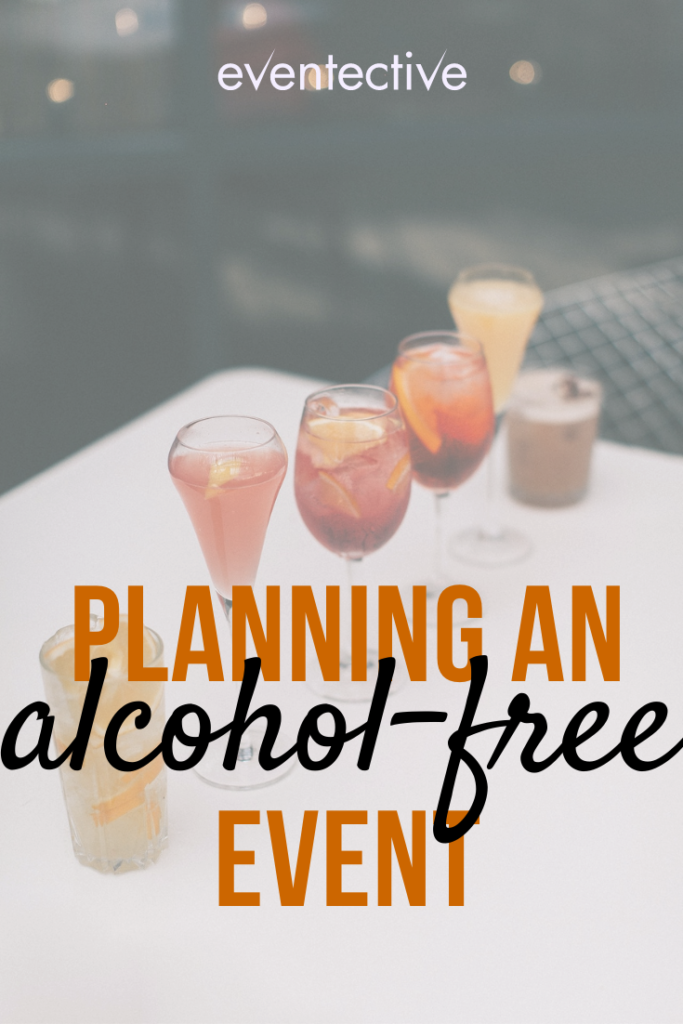
From weddings to birthday parties and corporate meetings, alcohol is a common guest at most events. In fact, according to a survey conducted by American Addiction Centers on Alcohol.org, wedding receptions hold the third spot for most alcoholic drinks consumed. Office parties and bachelor(ette) parties are on the list, too. And although alcohol is common at all of these events, there are plenty of reasons to host an alcohol-free event.
For starters, alcohol isn’t cheap. While open bars are the most expensive option, cash bars still come with a price tag. Even if you let guests bring their own alcohol, you’ll still have to pay a fee for that option. Plus, guests may be less likely to come if they have to plan ahead and bring their own drinks. If money isn’t an issue, your host may take issue with alcohol consumption. Whether it’s an employer, family member, or guest speaker, they just can’t support an event that serves alcohol. And, of course, you could have guests on your list who struggle with alcohol abuse. In those scenarios, it may be best to host an entirely alcohol-free event, as compared to an event with alcohol-free options.
Whatever your reason, there are plenty of ways to have a successful alcohol-free event. Skipping the alcohol can actually let you be more creative with your event and how you engage with your guests! Because alcohol is so common at events, there are ways you can plan ahead to encourage an alcohol-free environment. We address those ways in this handy guide—keep reading to see for yourself!
The Time of Day

Aside from the occasional morning mimosa or glass of wine at lunch, drinking during the day isn’t socially acceptable. Usually, drinking is associated with post-work or evening hours. In fact, you’ve probably heard the phrase, “It’s 5 o’clock somewhere,” before or even said it yourself. That association with drinking in the later hours means that most events are planned during the evening.
But with an alcohol-free event, you have the freedom to host it earlier in the day! Planning a morning brunch or afternoon lunch will tell your guests ahead of time that alcohol probably won’t be served. Plus, you may be able to plan a more academic or engaging event at that time of day. Your guests won’t be winding down from a long day—they’re just getting started.
The Format
Certain event formats are centered around the bar. Usually, when guests are networking or socializing, the bar is open. For example, if there’s time before or after a speaker for the guests to engage, that usually happens around the bar with a drink. Most social events have the bar open for the first few hours, too. But if you let your guests engage with each other during the event, there’s no need for a happy hour or debrief time.
Instead, format your event to be continuously social, not just at set times. For example, plan engaging mini sessions where speakers talk for 20 or 30 minutes instead of 60. Then, let the guests break out into nearby groups to debrief for 15 minutes. That way, your guests don’t need the usual hour-long post-event debrief time at the bar. Or plan activities that aren’t compatible with drinking and choose round-table seating over rows of audience chairs.
The Alternatives

Offering food and drink is still an important part of hosting—even if you’re planning an alcohol-free event. Eating and drinking are great ways to bring people together—especially strangers with common interests. So if you want to use your food and drink to encourage socializing, introduce mocktails at your event. Mocktails is a combination of mock and cocktail, and it refers to traditional mixed drinks without the alcohol. Create signature mocktails for your event for the bar-scene feel without the booze.
If you want to avoid the bar theme altogether, offer cafe-style food and drink. Provide tea, coffee, and baked goods for a morning brunch or half sandwiches, soda, and iced tea for a lunch and learn. Sometimes your alcohol-free event can resemble the bar scene, and sometimes it can’t.
The Venue
You can encourage an alcohol-free event with your venue in two ways. First, choose a venue that doesn’t lean on drinking. For example, cross the winery off your list, along with the spot with a big, built-in bar. Those places will just remind the guests what they’re “missing.” Second, let the venue be the star. Find a stunning spot that will keep your guests talking—and keep them from leaving early—even after the event is over. Book a venue with a beautiful view, ornate features, or the freedom to bring your own decorations.
The Invitations

We know that we keep saying it—but alcohol is common at most social events, so your guests may expect it. And your event is successful when your guests have fun. So let your guests know ahead of time! Certain information, like the time of day, might give them a hint, but don’t rely on that. Add that information to your invitations and your event website. Telling your guests will set the mood before they even arrive. They won’t be disappointed or confused when they don’t see the bar, and they can come prepared for a more interactive event.
Conclusion
Alcohol-free events certainly aren’t the norm, but that doesn’t mean they can’t be fun, engaging, and creative. During the planning process, you may have to re-think key elements—like the venue or time of day—for a more dry-friendly environment. But with proper planning and attendee communication, you can have successful event without the booze!
Have you ever been to an alcohol-free event? Share your experience with us below!

